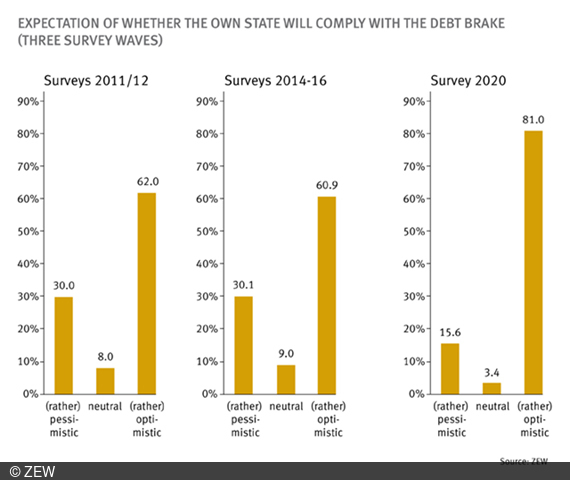Politicians at State Level in Favour of Adding Investment Clause to Debt Brake
ResearchThe coronavirus pandemic puts a considerable strain on public finances in Germany. Nevertheless, amid the crisis, a large and stable majority of state parliament members is backing the debt brake: Just over two thirds of the state MPs are in favour of returning to a balanced budget after the coronavirus pandemic. However, more than half of respondents say they are open to reforming the debt brake to allow larger deficits for investment. This is the result of a survey conducted by ZEW Mannheim and the University of Mannheim among members of all 16 German state parliaments in the period between May and July 2020.
The debt brake, which has been enshrined in Articles 109 and 115 of the Basic Law since 2009, has limited the federal government’s structural – i.e. cyclically adjusted – deficit to 0.35 per cent of GDP since the fiscal year 2016. For the state governments, this legislation became binding in 2020 – albeit with exceptions. “The debt brake has helped contain the debt level in German over the past decade. Thanks to this consolidation process at a time of favourable economic development, Germany has been better able than almost any other industrialised country to finance a resolute stabilisation policy,” says Professor Friedrich Heinemann, research department head at ZEW and co-author of the study. The severe fiscal shock triggered by the coronavirus pandemic is one of these exceptions, and it has intensified the debate over whether the debt brake will still be economically desirable after the COVID-19 crisis is over. Against this background, ZEW conducted – for the third time – a survey among all 16 German state parliaments asking about the debt brake and its need for reform. Around 30 per cent of German state parliamentarians participated in the survey.
Returning to a balanced budget after the pandemic
The survey revealed an increased optimism regarding the ability of the federal and state governments to adhere to the limits of the debt brake on the eve of the COVID-19 pandemic. Around 80 per cent of parliamentarians stated that before the crisis they were confident that their home states would manage to meet the target of a balanced budget according to the debt brake rules. The share of state MPs expressing optimism about meeting the deficit target has increased significantly compared to previous surveys conducted since 2011. Even in the midst of the pandemic, there is still widespread support for the debt brake: A majority of 68 per cent of all respondents expressed their general support for returning to a balanced budget after the COVID-19 pandemic is over. Only 22 per cent reject a return to the debt brake.
The coronavirus pandemic could provide impetus for reforms of fiscal rules
Nevertheless, the COVID-19 crisis has noticeably increased the willingness to reform the debt brake. The share of state parliamentarians who wish to leave the rules of the debt brake completely unchanged decreased from 47 to 30 per cent as a result of the pandemic. The outbreak of the coronavirus crisis has prompted a majority of MPs – 56 per cent – to support a reform that would allow greater deficits for infrastructure investments. Compared to such a new investment clause, a relaxation of the constitutional debt brake in order to finance climate policies through deficit spending enjoys less support among the survey participants (32 per cent). An even smaller share of respondents (26 per cent) spoke in favour of an overall more lax approach to the balanced budget rules. “While the parliamentarians still identify themselves with the debt cap policy, the coronavirus crisis has nurtured doubts about its previous design,” explains Heinemann. “All in all, the results of the survey have revealed that the COVID-19 pandemic could lead to reforms of the fiscal rules. However, amendments to the debt cap require a majority of two thirds of the members of the Bundestag and Bundesrat. In view of the strong support at state level, however, the reform of the debt brake that links government deficit to investment seems to be within the realm of what is possible.”

